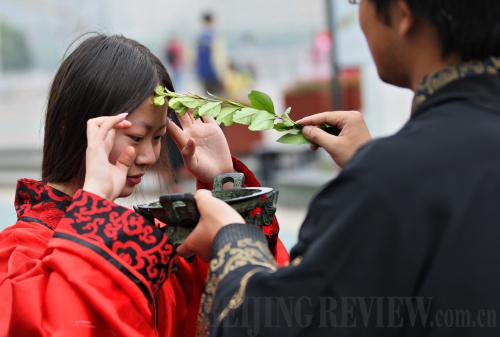|
 |
|
TOUCH OF CULTURE: A teacher applies realgar wine by using mugwort leaf on a girl's forehead, believed to dispel disease and evil spirits during a Dragon Boat Festivities in Nantong of Jiangsu Province on June 11 (XU PEIQIN) |
According to Records of Rites, a Confucian classic, in the fifth lunar month, yang, which represents life or masculine energy, reaches a peak and begins to decline, while yin, which represents death or female energy, begins to reemerge and grow. Therefore, the fifth lunar month was regarded as a time when the balance between yin and yang is broken and all kinds of diseases can strike. It contrasts with people's assumption that the end of summer is the time when yang starts to decline.
It was believed that the day was unlucky, as it was soon followed by midsummer, which would bring various maladies that could spread rampantly in hot and humid weather. In ancient times, the Chinese considered this time of year especially dangerous when extra efforts had to be made to keep safe.
Ancient Chinese employed several methods to fight evil and disease, which were believed to be very useful. People drank and bathed in herbal soup, while adults drank realgar wine to remove poisons from the body. The latter was believed to be a powerful antidote for all poisons, and thus most effective to kill insects and drive away evil spirits.
Families hung various herbs, such as cattail and mugwort, on their gates for protection, while sachets containing various herbs were worn to keep the wearer from contracting any illness. Besides, some people would also wear charms and talismans. Children, who are believed to be most vulnerable to disease and evil, would wear necklaces or bracelets, made of red, yellow, blue, white and black threads, for the purpose of staying safe. Children would also have the Chinese character wang, which means "king," written on their foreheads with realgar wine.
In addition, to dispel evil spirits, families would put pictures of Zhong Kui, a legendary Chinese ghost-catcher believed to be able to guard against evil, on the front doors of their homes.
Pictures of the five deadly poisonous insects, namely, scorpions, centipedes, toads, snakes and spiders, were also used to exorcise evil with evil. All these pose as strong evidence that the original cultural basis for the Dragon Boat Festival is the removal of evil spirits and illness, reflecting ancient Chinese wisdom in using herbs to reach the goal of living in harmony with nature.
"I never knew that the festival can be celebrated in this way. It's not only interesting, but also culturally rich and inspiring," said Jin Tianyi, a 19-year-old college student. "Before, I only knew that it commemorated poet Qu, but now I know this is mostly a day for us to make more effort to keep away from illness in the coming midsummer." Jin said he has become more aware and proud of Chinese history and traditional culture since he began to take part in these cultural activities.
The Dragon Boat Festival has become a legal holiday since 2008 together with the Tomb Sweeping Day and Mid-Autumn Festival, commemorated for thousands of years in China.
Turning such festivities into public holidays shows the Chinese Government's high regard for traditional culture. However, at the ground level, many still fail to see the significance of events such as the Dragon Boat Festival.
Many of China's traditional festivals are in danger of being marginalized. While making them legal holidays to preserve culture, these traditional festivities are becoming increasingly popular among young people, who hope traditional customs like the Dragon Boat Festival could be further enriched for thousands of years to come.
Email us at: panxiaoqiao@bjreview.com |
